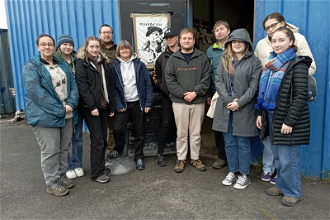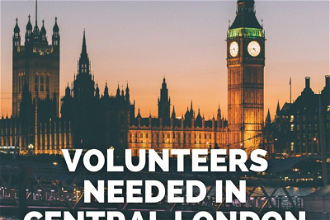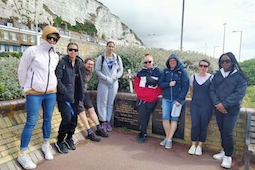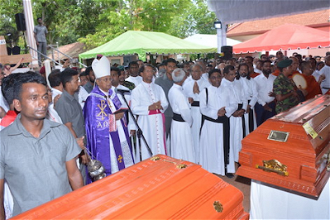A caravan called TOWIE ... Reflection on visit to Calais Jungle
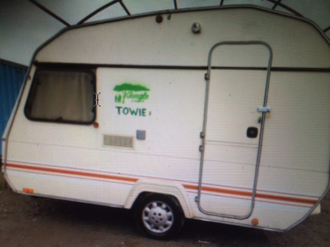
A caravan called TOWIE
A caravan called TOWIE, French bulldozers, and an amazing group of Belgians Reflection on visit to Calais Jungle
Today's visit begins with the story of a caravan called TOWIE, a little two berth caravan that was lying unused in Harold Wood, Essex. It was reclaimed for just £300 by a wonderful and tiny charity called Jungle Canopy (you can find them on Facebook) who christened it TOWIE and brought it to Calais. The story deepens as they began to get the caravan ready for a family; a Syrian father, mother and their fourteen year old daughter arrived at the camp, and were clearly in dire need.
The volunteer I met said that the mother and father were "hollow" - as if all the life had been taken from them. They arrived worn out, with no money or possessions other than the clothes they stood up in. This is very often how people arrive at Calais - but these parents carried the particular and desperate tragedy that in the crossing to Greece their two younger children had drowned.
Benedict Cumberbatch speaks powerfully for the refugees, and I once heard him say on Sky News, "A parent would only put their child in a rubber boat, on uncertain seas, if the water was safer than the land." Consider the pictures of Aleppo, or Homs - once thriving towns, with ancient cultures, now reduced - literally - to rubble. What parent would keep their child in a city where snipers fire bullets and planes drop bombs. And these parents, trying to keep their children safe, trying to find a fresh start and fresh hope, had seen two of their children die on their way to Europe.
Somehow the mother, father and surviving daughter had got to Calais - ragged, exhausted, and grieving. Can any of us imagine the journey? The emotions of those parents? It was the 14 year old daughter, the volunteers said, who had become the "rock", holding things together. And then they had arrived in the Calais Jungle, and this is where the little caravan called TOWIE comes in.
The family needed a place that was, at least, dry and stable. A place to call home, at least for a while. A place to grieve and hug, a place to try to live family life. So for two days volunteers had worked on the inside of the little caravan, and they showed me the beautifully coloured bedspread they had made for the teenage girl, the bedding and clothes for her parents. There were freshly made curtains at the windows. And on the girl's pillow, a box of milk tray chocolates. The little caravan called TOWIE will stay in my heart for a very long time. For this is life in Calais - the very guts of life, raw and fragmented, with utter despair and tragedy mixed with beautiful hope and kindness.
In the countries they have fled, the Calais Refugees were doctors, lawyers, journalists, architects. They were professional people with good lives. In Calais they are enterprising - with charity help, more and more of the camp is becoming tarpaulin and wood shelters, sturdier than tents. There are little shops, and lots and lots of cafes where the most basic ingredients are turned into flavoursome food, sold for pennies, or even given away - the cafes are community spaces, spaces that are warm, spaces for company and conversation, even games like chess and cards, as the refugees wait ... And wait.
It is hard to see what will end the waiting. The charity effort in Calais is fledgling: the main charities Calaid and Care4Calais just a few months old. As fast as donations arrive, they are sorted and distributed; these excellent charities are doing extraordinary and heroic work, with no spare resource or capacity.
The French Government will not declare the Calais "Jungle" a refugee camp, so the resources of the UN are absent. The British Government will not provide a consular office, so no asylum claims can be processed, even for those with relatives in the UK.
In the camp we met a dynamic young volunteer called Joe. Working in several languages he moved around getting fresh information, and sorting out situations where specific help and aid were needed. With great sadness, he spoke with me about the one change that was immediately visible on arrival at the camp: last week the French government sent in bulldozers to the camp, and - with 48 hours' notice - they bulldozed a strip 100 metres wide, from the motorway, creating a "no man's land" of a great expanse of mud, piling it into a high escarpment along the edge of the camp.
The drainage - already bad - was made much worse. And the little shanty structures of bits of wood and bin bags that we have seen so many of on previous visits can hardly be taken down and re-erected elsewhere. How do we put words to this? Traumatised people, who have fled war and persecution, were bulldozed out of shacks by the French Government.
France is a country deeply formed in Christian history and culture, over centuries. A good number of the refugees are Christian, and they have fled IS beheadings and torture. So there is a particularly deep and tragic irony that in amongst the dwellings they bulldozed a church.
Joe, the young volunteer, was very clear about one other point - "don't lose joy," he said (echoing Pope Francis). "Don't lose joy." So to finish with some joy, let me share with you an amazing group of Belgians! We spent time in the morning at the Care4Calais warehouse - our blankets, sleeping bags, coats and medicines were very gratefully received, and then we sorted clothes from other general donations. For a bit of light relief, it is amazing that people would donate a glorious pair of bright purple high heeled shoes, or a T-shirt with the slogan "two's company, three's a fantasy" but there they were! Anyway, the Care4Calais criteria for sorting is clear: "Can we give it to someone with dignity?" Or to put it another way, "if someone has spent three hours queuing for it, will theybe delighted to receive it?" It is a good policy, and helps build decency, trust and care in the relationship between the charity volunteers and the refugees. The high heeled shoes and slogan bearing T-shirt stayed on the "Wall of shame" - along with a pair of ripped underpants that someone had seen fit to donate!
And so to the Belgians. We were asked to take about 500 large jars of Ragu from the warehouse into the camp. "No problem - where to?" "To the Belgian kitchen." Ragu? To the Belgian kitchen?! OK. And when we got there, we understood the name. The kitchen had come into being because of the superb work of a group of Belgian volunteers a few days earlier. They had cleared out an area and put pallets across the floor. Even in rain, there would be stable flooring. Onto it had been put heavy duty army type tents, and in there were kitchen facilities. Secure food stores were in place. And the Ragu we brought from the warehouse? This was to be put with pasta to feed a thousand - a thousand - people a day. From voluntary donations. Why? Because in the camp people are hungry, very often. The food distribution can be very patchy, especially when (as now) the camp is muddy and difficult to navigate. And so the Belgian volunteers' effort (with Italian food!) will at least make sure more people have some nourishment.
I travelled with young adults from the parish - Delia, Ben, and Idriss - along with Suzan, an adult parishioner who fled Iraq with her young family in the late 1990s. With us was Rev Colin Hopkinson, from St John's Langdon Hills, who have been greatly generous in their support. And we met Kathleen O'Brien, from Cafod, at Dover. Together we stood in the little church that was on Songs of Praise last summer, and that we have visited before - St Michael's - which is still standing, and prayed the "Our Father." We prayed in English & in Arabic: it is the same prayer.
On the way home there was much to reflect on. Delia summed it up for all of us "I feel humbled," she said. "To think I got stressed about a crack in my windscreen last week. This really puts my life into perspective." It does. For all of us.
If you would like to offer more help - and even volunteer at the camp for a week, or a month - then there are more details on the next page. Please pray for the refugees in the Calais Jungle. Please pray for peace in Syria, in central Africa, and across the Middle East.
Fr Dominic Howarth 6th February 2016
Volunteering in Calais
Opportunities for short and long term volunteering with Care for Calais (www.care4calais.org) plus a new house being started by Catholic Worker if you can stay for a week or more. Contact Email: johanmaertens@hotmail.com Phone: UK 074 3685 4544
Could you support the Calais Refugees? The aid being delivered from Basildon is inspired by the work of Seeking Sanctuary, and in Calais we are working with Secours Catholique, Auberges des Migrants and Care4calais. Wherever aid will best and most effectively be used, we deliver a package about once a month, and we adjust it based on what those in Calais all the time are telling us is most useful.
In September, we took mainly shoes and clothes.
In October, we took toothpaste, soap, toothbrushes, pants and socks, packaged into "1000 packets of hope and love", with messages from our schoolchildren.
In November we took blankets, duvets, some cough medicine, and 1000 hats and gloves.
In December we delivered £7500 worth of basic medicines - cough mixture, nit combs, and medicines for scabies, along with 1000 tubes of toothpaste and 1000 bars of soap.
In early 2016 we had intended to deliver insulation, but the rough weather and the bulldozing of part of the camp meant we were alerted to a very urgent need for sleeping bags and blankets, which we brought in early February 2016. We also brought £2,500 worth of medicines. A £1000 donation was specifically given to us for shelter, and we will pass this to "Jungle Canopy" for caravans, as this now seems the best way to ensure shelter for the most vulnerable.
The appeal for sleeping bags and blankets continues, and we will travel again in early March. Please only donate sleeping bags and blankets; generally, we have found that as donated items come in a wide variety of sizes and styles, they can be hard to sort and distribute. We aim for multiple units of items, and have found wholesalers that will support us in the quality, price and uniformity of what they offer.
We therefore gratefully accept donations of any amount, as cheques payable to "Our Lady and All Saints." Please mark the envelope "Calais" and post to: Fr Dominic Howarth Calais Appeal Holy Trinity Church 71 Wickhay Basildon SS15 5AD The money is strictly ringfenced and used only for items to support the refugees.
The petrol, ferry and any other costs of the journey are covered by private donation, and so every penny received is spent on the items for the refugees. If you are a group or individual wanting to help, then contact www.care4calais.org or use the website www.calaidipedia.co.uk which has all the information you need, and co-ordinates a wide variety of aid deliveries and volunteer offers of help. For additional information specifically about the Basildon project, which is supported by a number of churches and individuals in Basildon, and other parishes within the Diocese of Brentwood, please feel welcome to email frdominic@basildoncatholics.org or call 01268 281732.



